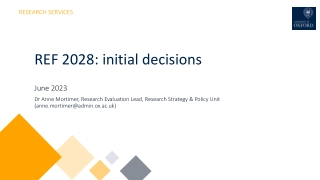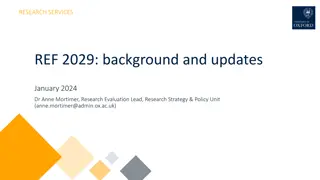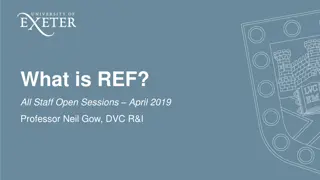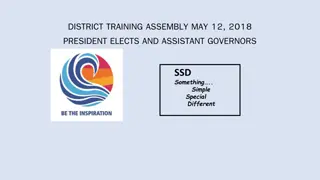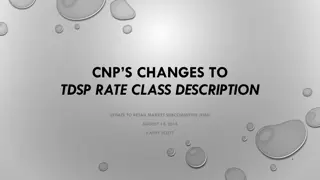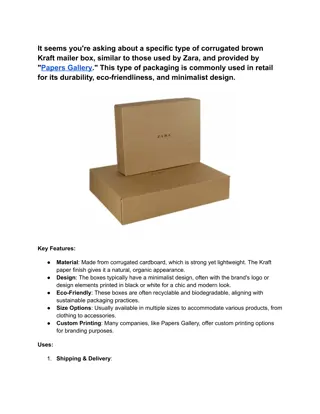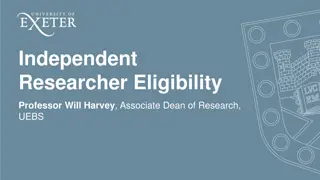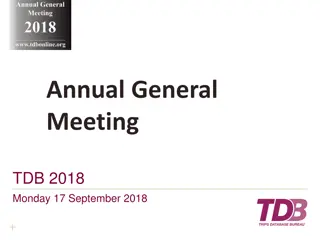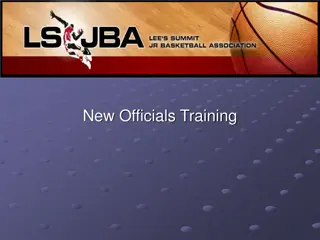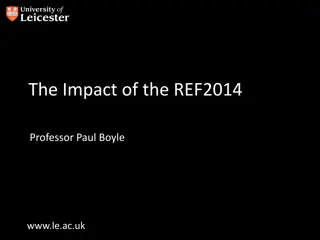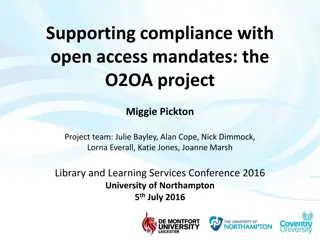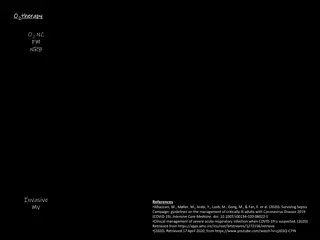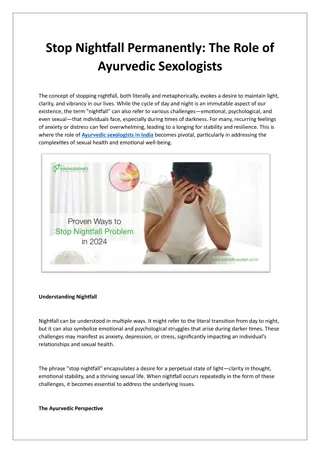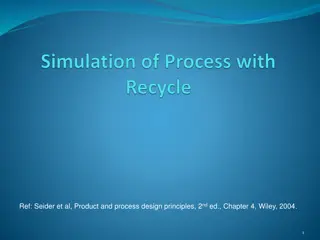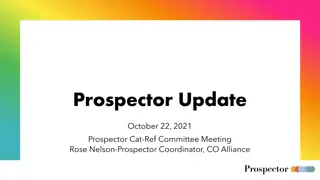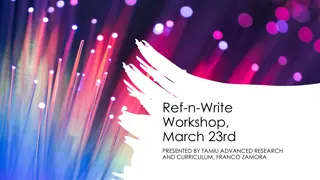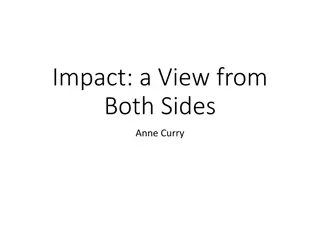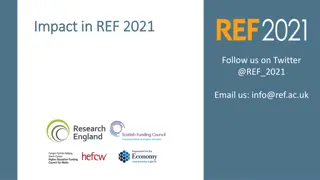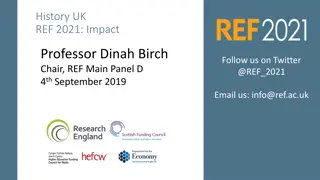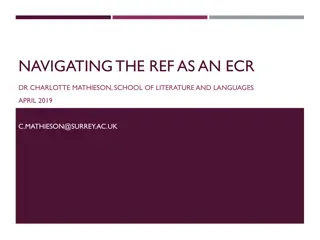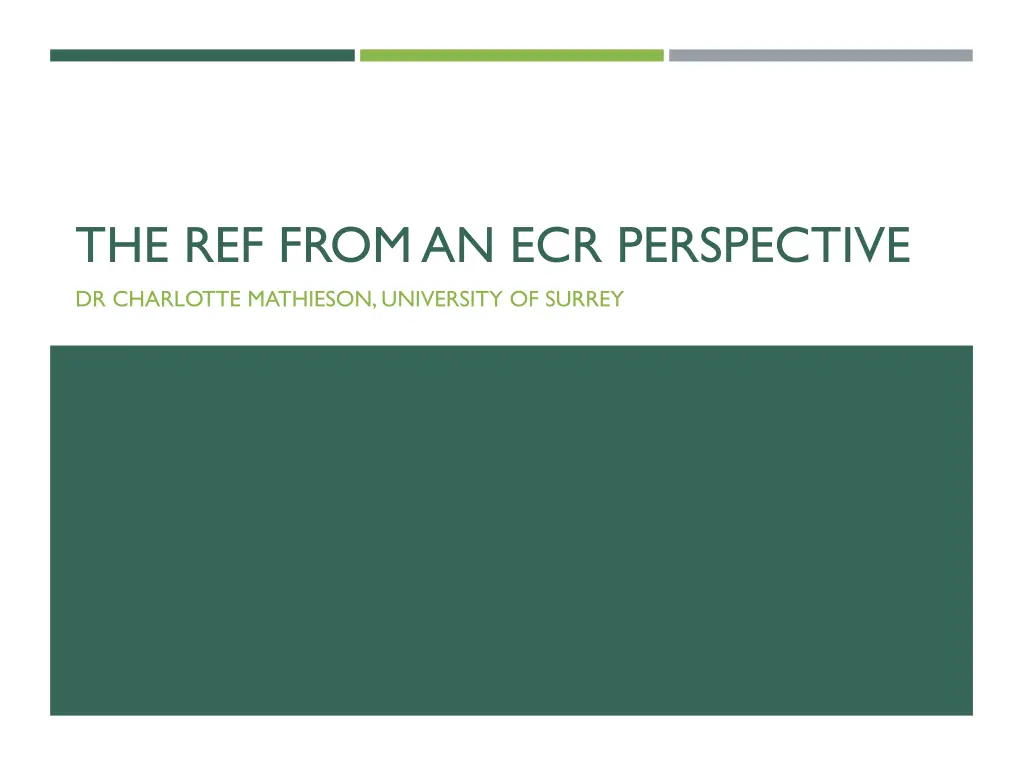
Navigating the REF: Key Strategies for Early Career Researchers
Discover essential insights on the Research Excellence Framework (REF) from the perspective of early career researchers. Learn how to balance quality and quantity in publications, tackle key issues, and develop a solid REF plan to thrive in academia.
Download Presentation

Please find below an Image/Link to download the presentation.
The content on the website is provided AS IS for your information and personal use only. It may not be sold, licensed, or shared on other websites without obtaining consent from the author. If you encounter any issues during the download, it is possible that the publisher has removed the file from their server.
You are allowed to download the files provided on this website for personal or commercial use, subject to the condition that they are used lawfully. All files are the property of their respective owners.
The content on the website is provided AS IS for your information and personal use only. It may not be sold, licensed, or shared on other websites without obtaining consent from the author.
E N D
Presentation Transcript
THE REF FROM AN ECR PERSPECTIVE DR CHARLOTTE MATHIESON, UNIVERSITY OF SURREY
THE REF FROM AN ECR PERSPECTIVE: KEY ISSUES You know what s expected but how do you put it into practice? You need to be REF-able to get a permanent post; You have limited (and probably unfunded) time for research; You re not sure if you will be in a REF-able post; The REF (and discussion around it) is stressful, and more so if you are precarious.
THE REF FROM AN ECR PERSPECTIVE: OUTLINE Applying the rules key pointers for creating a REF publication plan REF on the job market REF and mental health REF going forward staying informed and updated
1. APPLYING THE RULES: KEY POINTERS FOR A REF PLAN Quality / quantity Timing Flexibility
CREATING A PLAN: QUALITY NOT QUANTITY Quality not quantity = golden rule Fewer, high quality publications is preferable to lots of lower ranking pieces New system of average multiplier rather than a portfolio of submissions per staff member = flexibility/pressure to make each output count for as much as possible Time-efficient if you are stretched for research time as an ECR: focus on producing the best research in the time you have available.
QUALITY NOT QUANTITY: GUIDING PRINCIPLES Prioritise: Monograph: single-author, substantial (80-100k words) original research; can be double-weighted in REF. Article: 8-10k word original piece of research in peer-reviewed,respected journal. De-prioritise: Chapter in edited book collection: typically peer-reviewed (may lack rigour of journal);often shorter (5-6k words). Book review: (typically) not original research,shorter (1k words). Editing a book/special issue: not (necessarily) original research (but a lot of work).
QUALITY NOT QUANTITY: WHAT IS A GOOD NUMBER OF OUTPUTS? No golden rule REF = Minimum of 1;average of 2-3;maximum of 5 REF on the job market:not yet clear how this will play out An academic track record and/or publications commensurate with the postholder s career stage ; Focus on quality not quantity:employers see rigour,and understand that quantity comes with time.
CREATING A PLAN: TIMING REF census date: 31st July 2020 Key question: will you be in a REF-able post?
WILL YOU BE IN A REF-ABLE POST? YES/I HOPE TO BE SO In this scenario: you are currently or soon to be on the job market for a permanent post and therefore: Your plan needs to aim towards having a REF-able portfolio by 31 July 2020: Work backwards from the census date; factor in publication lead times: journal /publishing press timescale for submission, peer review, revisions, production process can be anything from six months to 2 years (+!) Journal special issues can be faster Talk to others about their experiences of different journals and book publishers
WILL YOU BE IN A REF-ABLE POST? NO In this scenario: as the census date approaches, you become aware that you might not be in an REF-able post by July 2020. In this case, you may be better holding back some of your outputs (e.g. monograph) for post-2020 2011 finished PhD 2012-15 in non-REF-returnable job for REF 2014 = delayed 1stmonograph for 2015 publication i.e. within REF 2020 cycle Next monograph = aiming for publication post-2020 REF
CREATING A PLAN: SUMMARY AND FLEXIBILITY Focus around quality/quantity and timing Have a plan, even if it changes: Having a plan means being able to make the most of the time you have available to focus on what will be most valuable to your development Check back in regularly to reassess your current/pipeline research, and keep track of where publications are up to Having a plan will also serve you well in the job market.
2.ON THE JOB MARKET REF on job applications and at interview
REF ON THE JOB MARKET: APPLICATION STAGE Job specifications typically include the criteria of being able to contribute to the REF It is important that you evidence this clearly and directly in your application/cover letter don t rely on your CV to speak to this Reiterate the wording on the job specification (e.g. contribute to advancing research productivity/research strategy) Refer specifically to the publications that would constitute your REF submission; Include publisher/journal titles; You can include an estimate of quality (3*/4*); Include pipeline works, but be specific. Include impact potential if you have it (full case study not necessarily expected but show possibilities)
REF ON THE JOB MARKET: APPLICATION STAGE EXAMPLE My research strategy for the next five years focuses on completing a portfolio of 4* work for REF submission. I am able to contribute a high-quality submission to REF 2020, with an eligible monograph ( , X publisher, X year) which has strong potential for 4* ranking through global distribution, an article in the international journal X, and two further articles currently in preparation for journals with 4* potential: X topic for X journal and X topic for X journal The contemporary relevance of my research into X has significant outreach and impact potential and, drawing on my previous public engagement experience X, I will be proactive in developing an impact plan which includes local schools, museums such as the X Museum, and working with policy advisory boards such as X.
REF ON THE JOB MARKET: INTERVIEW STAGE Be prepared to answer the question what will your REF submission be? Be prepared to reiterate and elaborate upon the information that you have given in your application/cover letter Focus especially on pipeline works, giving evidence of what/when/where: this is especially important if you have a number of pipeline works, as an employer needs to see that these are guaranteed potential submissions
3.REF AND MENTAL HEALTH Report on the impact of REF 2014 on ECRs: REF had a huge impact on ECR mental health and wellbeing; many respondents experienced high levels of anxiety, insecurity and uncertainty, and mental health problems stemming from REF pressure; also noted feeling isolated and unable to articulate concerns within highly pressurised and competitive workplace culture created by the REF; Lack of/conflicting/mis- information from institutions cited as a contributing factor. (See the impact of the REF 2014 on ECRs)
REF AND MENTAL HEALTH The emotional, physical, and intellectual work taken to sustain performances of disciplinary legitimacy (117) Sarah Burton, Writing yourself in? The Price of playing the (feminist) game in the neoliberal university , in Feeling Academic in the Neoliberal University: Feminist Flights, Fights, and Failures. Yvette Taylor and Kinneret Lahad (eds). Palgrave Macmillan. 2018.
4.FURTHER RESOURCES Draft guidelines are expected this summer and released on the REF website: http://www.ref.ac.uk/ I report on the latest updates on my blog and try to make the guidelines accessible and applicable to ECRs: https://charlottemathieson.wordpress.com/
C.Mathieson@surrey.ac.uk @CEMathieson

